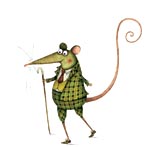Spectator: The pain and pleasure of nettles
Lucy Baring gets to grips with the benefits of nettles.

Exquisite houses, the beauty of Nature, and how to get the most from your life, straight to your inbox.
You are now subscribed
Your newsletter sign-up was successful
Although most people consider the coming weeks to be among the most delightful in terms of plants and promise, I’ve recently been talking to someone for whom they bring only terror. She said that she couldn’t enjoy a country walk from now until autumn because she has a pathological fear of stinging nettles.
As a toddler, she fell into a huge patch of nettles and remembers the tall, hairy stems waving in front of her eyes as she got stung and stung again. Barely able to walk, she couldn’t get up and away. She became quite shivery while recounting this traumatic memory and we had to change the conversation. However, it seems Urtica dioica has more fans than foes. Everything from eczema to arthritis, gout to anaemia, joint pain, sprains, insect bites, urinary infections, high blood pressure, hay fever the list is extensive can be helped by the common nettle. In fact, reading some of the material on the benefits of stingers, you’d think we could do away with most other medicines.
I’ve tried making nettle soup from the youngest spring plants, but I didn’t give them much of a chance, chucking them with distaste into water and whizzing up the result into a tasteless, green mush with an undertone of rubber gloves. The tea is even worse, but then I didn’t add honey. Next stop, pesto.
It’s also thought that consuming nettles can help children overcome allergies, which I mention to my mother as we discuss the recent evidence that small, regular amounts of peanut butter seem to help prevent susceptible children from developing a peanut allergy. Nobody knows why the numbers of peanut allergies in western countries have doubled in the past decade. ‘Well, of course, I never saw a peanut as a child,’ says my mother. ‘We didn’t have nuts either unless you had a walnut tree.’
Without a doubt, the moment peanuts first really entered her consciousness was when ‘Oper-ation Groundnuts’ hit the headlines. In a scheme that makes introducing salmon fishing to the Yemen look like common sense, the British Government of 1947 decided to clear 3.21 million acres of Tanzania (then Tanganyika) to plant gigantic peanut fields, thus creating 32,000 jobs for locals and providing up to 800,000 tons of peanuts, which would be ship-ped back to British kitchens during a worldwide shortage of cooking fats.
The plan hit problem after problem, including the only railway line being destroyed by flash floods and killer bees stinging bulldozer drivers so that they were hospitalised. The terrain, described by a local farmer as ‘mile after mile of damn-all’, was dense, with impenetrable bush that broke machinery within days and the clay earth became so hard-baked by sun that the nuts, such as there were, could-n’t be harvested.
The plug was finally pulled on the project after four years, having cost approximately £970 million in today’s money. I ask a friend who grew up in Tanzania if this is still talked about and she confirms that there are families of farmers still laughing about Operation Groundnuts.
Exquisite houses, the beauty of Nature, and how to get the most from your life, straight to your inbox.
I’m not suggesting that anybody is going to start cultivating nettles on a commercial scale that would be mad. But you can buy them (£1.45 per gram of seeds or £7.99 for a two-litre pot), which strikes me as biz-arre. I didn’t know you could charge for the Devil’s Plaything in its natural state.
And yet I find myself wondering whether to buy a bottle of nettle-root oil, which is, apparently, a cure for baldness. ‘Do you mind that you’re going bald?’ I ask Zam, before clicking ‘buy’. He pauses over his toast. ‘No,’ he says evenly, ‘but then I wasn’t aware that I am.’ Nettles a miracle cure for everything, except, it seems, a chronic lack of tact.

Country mouse visits Crufts 2015
Country mouse attends the world’s biggest dog show.

Town mouse attends the 2015 Aldeburgh Literary Festival
Town mouse enjoys the best of British literature.